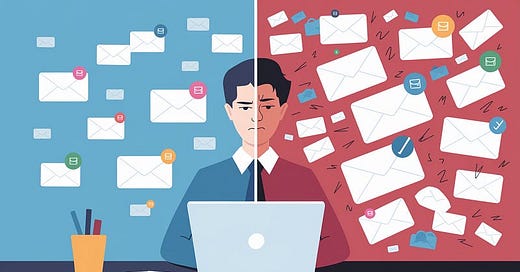In today’s hyper-connected world, emails have become indispensable. Whether it’s for personal communication, work, shopping, or signing up for services, it often feels like one email isn’t enough. But does having multiple email accounts help, or does it just add to the chaos? Let’s break down the pros and cons of juggling multiple emails.
Pros of Having Multiple Email Accounts
1. Better Organization
Separation of work and personal life: Having separate emails for different aspects of your life keeps things organized. Your work emails stay professional, while your personal emails don’t get cluttered with office tasks.
Easier to manage newsletters: You can dedicate one email to newsletters or promotions, so your main inbox stays clean and focused on what matters.
2. Enhanced Security
Mitigating data breaches: If one of your email accounts is compromised, having others ensures that your sensitive information isn’t all in one place. Use one email for important accounts (banking, social media) and another for low-risk activities like signing up for trials.
Reduced phishing risk: By keeping your primary email private, you decrease the likelihood of phishing attacks targeting your most important accounts.
3. Reduced Spam
Disposable emails for short-term use: You can create a secondary or disposable email for websites that require a sign-up, reducing the amount of spam sent to your main inbox.
4. Privacy Control
Limiting data tracking: Multiple emails help to separate your identity across platforms. This can stop companies from tracking your activities too easily, as each service is linked to a different email address.
Cons of Having Multiple Email Accounts
1. More Accounts to Manage
Time-consuming: Juggling multiple accounts can make checking emails a hassle. You’ll need to log in and out or check various inboxes if you don’t use a central management tool.
Forgotten passwords: More accounts often mean more passwords to remember, increasing the chance of being locked out of an important account unless you use a password manager.
2. Possible Missed Emails
Important messages get lost: When you have too many accounts, an important email might go unread because it ended up in an inbox you don’t check as often.
3. Email Fatigue
Increased cognitive load: Managing multiple emails might lead to feeling overwhelmed. The mental load of tracking different accounts can outweigh the benefits if you’re not organized.
4. Security Risks
Weak security across accounts: If you use weak passwords for some emails or don’t enable two-factor authentication (2FA), having multiple accounts could actually put your information at greater risk. It’s crucial to keep all your accounts secured.
How to Manage Multiple Email Accounts Effectively
If you’re convinced that having multiple emails can work for you, here are a few tips to manage them effectively:
Use an email client: Tools like Outlook, Thunderbird, or Gmail’s multi-inbox feature allow you to manage multiple emails from one place. This way, you don’t have to log in and out constantly.
Implement a password manager: A good password manager helps keep track of all your login details, reducing the chance of getting locked out or using weak passwords.
Create labels or folders: For each email account, create folders or labels to sort incoming mail automatically. You’ll instantly see what’s important and what’s not.
Schedule check-ins: Decide on specific times to check each email account. This will prevent email overload while ensuring nothing slips through the cracks.
Conclusion: Do Multiple Emails Work for You?
Ultimately, the decision to use multiple email accounts depends on how much control and organization you want. For some, one email is sufficient, but for others — especially those juggling work, personal life, and various subscriptions — having multiple emails can be a game changer.
Just make sure that you have a solid strategy in place to manage everything efficiently, from organizing inboxes to securing accounts. Because, without a plan, more emails can easily mean more chaos.
Feel free to experiment with what works best for you. Whether you stick to one account or create several, managing your inbox smartly is the key to avoiding overload and staying on top of things.
Disclaimer: The advice in this article is for educational purposes. Always evaluate your personal needs and security considerations before managing multiple accounts.




